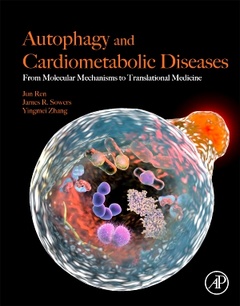Autophagy and Cardiometabolic Diseases From Molecular Mechanisms to Translational Medicine
Auteurs : Ren Jun, Sowers James R., Zhang Yingmei

Autophagy and Cardiometabolic Diseases: From Moleculer Mechanisms to Translational Medicine covers the science of autophagy in relation to cardiometabolic diseases and the future therapeutic potentials of autophagy regulation in these processes. Processes are not described in isolation, but in concert with other cellular and/or metabolic processes, such as lipogenesis, glucose, energy metabolism and apoptosis. This approach recognizes the multifactorial nature of cardiometabolic diseases, including obesity, diabetes, insulin resistance, hypertension and dyslipidemia. The book provides explanations, while also distinguishing the delicate role for autophagy in pathogenesis and exploring complications for cardiometabolic diseases.
By targeting autophagy, it offers new avenues for drug discovery and treatment for cardiometabolic anomalies. It is a perfect resource for cardiology researchers, scientists and medical practitioners.
Section I. Cell biology of cardiometabolic syndrome and autophagy1. Overview of cardiometabolic syndrome2. Overview of autophagy and its molecular regulation3. Interplay among oxidative stress, redox signaling, ER-stress, autophagy and protein ubiquitination4. Selective autophagy for specific organelles5. Experimental models of autophagy and measurement of autophagy6. Role of autophagy in cardiac physiology and pathophysiology
Section II. Autophagy and pathogenesis of cardiometabolic disease7. Autophagy and diabetes mellitus8. Autophagy and hypertension9. Myocardial Insulin Signaling and Autophagy10. Autophagy and obesity11. Autophagy and dyslipidemia12. Autophagy and stroke13. Polycystic Ovary Syndrome and Cardiometabolic Disease14. Autophagy and thrombosis, vascular inflammation 15. Autophagy and Proteostasis in Cardiac Aging16. Autophagy and central nervous system
Section III. Autophagy and complications of cardiometabolic disease17. Autophagy and chronic liver disease18. Autophagy in acute and chronic kidney disease 19. Autophagy and fetal programming20. Autophagy, oxidative stress and redox regulation
Section IV. Translational approach of autophagy21. Therapeutic drug discovery targeting autophagy I22. Autophagy: A new therapeutic target23. Autophagy regulates control of intracellular energy stores24. Autophagy and epigenetics25. Autophagy, exercise and life style modification
James R. Sowers, MD, is Professor of Medicine, Physiology/Pharmacology and Director of the Endocrinology, Diabetes & Metabolism Division at the University Of Missouri, School Of Medicine. In addition, he is the Director of the Thomas and Joan Burns Cardiovascular and Diabetes Research Center and holds the Thomas W. and Joan F. Burns Missouri Chair in Diabetology. Dr. Sowers serves as a reviewer on several study sections for the National Institutes of Health and for the Department of Veterans Affairs. He is the editor of Cardiorenal Medicine, Associate Editor of Diabetes and on editorial boards of Hypertension, Endocrinology, and Metabolism. In the last year Dr. Sowers has published more than 25 peer-reviewed papers.
Dr. Sowers achieved the Irvin Page Lifetime Achievement Award from the American Heart Association in 2012. He serves as a PI on one NIH funded grant and a VA Merit grant, and is a Co-Investigator on several NIH grants with colleagues at the University of Missouri, as well as other research colleagues at academic
- Explains the processes inherent in the protein quality control for pathogenesis and complications of cardiometabolic diseases
- Provides knowledge from internationally recognized contributors in the field
- Incorporates a translational approach, covering the basic cellular biology of autophagy and presenting the role of autophagy regulation for both pathogenesis and complication in cardiometabolic diseases
- Contains access to a companion website with additional illustrations
Date de parution : 04-2018
Ouvrage de 340 p.
21.4x27.6 cm
Thème d’Autophagy and Cardiometabolic Diseases :
Mots-clés :
Acetylation; Alzheimer's disease; Amino acid; AMPK; Antineoplastic agents/drug effects/autophagy targeted therapy; Apoptosis; Atherosclerosis; Autophagosome; Autophagy; Autophagy addiction/KRAS/BRAF-driven cancers; Autophagy flux; Autophagy induction; Autophagy inhibition; Cardiac; Cardiac aging; Cardiac disease; Cardiac remodeling; Cardio metabolic syndrome; Cardiometabolic disease; Cardiometabolic diseases; Cardiometabolic syndrome; Cardiomyopathy; Cardiovascular; Cardiovascular diseases; Cargo recognition; Cellular homeostasis; Chaperone-mediated autophagy; Circadian rhythm; Cirrhosis; Defective autophagy; Diabetes; Diabetes mellitus; Diseases; Dyslipidemia; Endothelial cells; Endurance exercise; Epigenetic regulation; ER; ER stress; Experiment models; Fasting; Fatty acid; Fetal or developmental programming; Fibrosis; Forkhead; FOXO; Gestational diabetes; Glucose; Glycophagy; HCC; Heart; Heart failure; Hemorrhagic stroke; High-fat diet; Huntington's disease; Hypertension; Hypertensive heart disease; Hypertrophy; Insulin resistance; Ischemia; Ischemia/reperfusion; Ischemic stroke; Kidney disease; LAMP-2A; Lipid metabolism; Lipophagy; Lysosome; Macroautophagy; Macrophage; Maternal obesity; Maternal undernutrition; Metabolic syndrome; Method; Mitochondria; Mitochondrial biogenesis; Mitophagy; mTOR; Muscle hypertrophy; Neurodegeneration; Nutrient sensing; Obesity; Oxidative stress; Parkinson's disease; PCOS; Pharmacology; PI3K; PKB; Placenta; Preeclampsia; Protein quality control; Proteostasis; Pulmonary hypertension; Quality control; Quantification; Reactive oxygen species; Resistance exercise; Sepsis; Sirtuins; Skeletal muscle; Smooth muscle cells; SNAREs; Steatosis; Stress response; TFEB; Therapeutic; Translational medicine; Triacylglycerol; Tumor dormancy; Tumor metabolism; Tumor metastasis; Tumor relapse; Tumor resistance; Ubiquitylation



